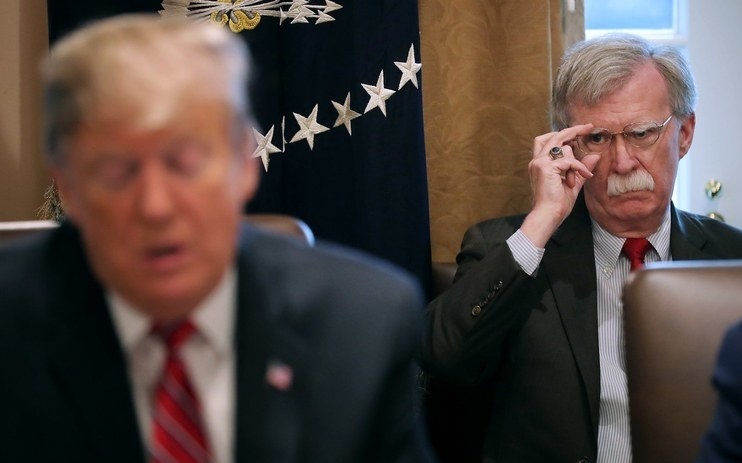National Security Advisor John Bolton watches as Donald Trump speaks (Chip Somodevilla/Getty)
Co-published with the Birmingham Perspective:
Donald Trump is an unconventional American President who won the office by breaking with the Republican line on some big issues. One was the wisdom of military intervention in the Middle East. As a candidate, he was blunt in criticizing his Republican predecessor George W. Bush’s decision to invade Iraq in 2003, describing it as a waste of money that had achieved nothing of value.
Trump’s upset win over many more experienced politicians revealed he had intuited something important they had not. Republican elites might have been wedded to neoconservative ideas about wielding American power overseas, but by 2015 its base voters were open to a different message.
Trump told them that overseas entanglements were a racket that did not benefit America’s real interests, and they applauded. The outcome of the 2016 contest was close and influenced by many factors, but Trump’s brand as the candidate promising no more Iraqs clearly boosted his appeal — especially as his Democratic opponent in the general election was establishment-credentialed liberal hawk Hillary Clinton.
So an American voter who is not attentive to foreign policy might be surprise to tune back in today and find the Trump administration ramping up US military deployments in the Middle East. This is apparent preparation for a military conflict with Iran, as the President threatens on Twitter to “end” that country.
See also Iran Daily, May 24: After Khamenei’s Rebuke, Rouhani Takes Tough Line on US
The Administration’s immediate justification is that its military moves are a response to credible intelligence about Iranian plans to attack US targets.
But the medium-term explanation is that the Administration has been ratcheting up pressure on Iran following its decision to withdraw the US from a multilateral deal which the Obama Administration reached with Iran over its nuclear program. This was partly driven by Trump’s reflex loathing of any major policy initiative of predecessor Barack Obama. However, it dovetailed with a conventional Republican view that Obama’s deal conceded too much to Iran without doing enough to restrict its support for militancy in the region or its pursuit of advanced missile technology. More pressure, it is contended, will deliver better results.
The long-term context is that US relations with Iran have been poisonous since 1979, when the Islamic Revolution toppled a pro-US monarchy and brought to power a regime for which antagonism with America is a foundational principle. The US has never accepted the legitimacy of Iran’s political order since that time, and overtly favors its overthrow. This background of fundamental mutual enmity makes all day-to-day interactions abnormally antagonistic.
A key variable leading things to come to a head now has been personnel changes to the Trump Administration foreign policy team. For the first stretch of Trump’s Presidency, his most senior national security officials favored a more cautious approach than the President to diplomacy and alliance-maintenance: National Security Advisor H.R. McMaster, Secretary of State Rex Tillerson, and Secretary of Defense Jim Mattis..
During 2018, Trump became frustrated by McMaster and Tillerson’s efforts to rein in his impulses and dismissed them. He replaced McMaster with John Bolton, a notoriously belligerent alumnus of the George W. Bush Administration, more recently a Fox News pundit. He replaced Tillerson with Mike Pompeo, briefly CIA Director but before that a Republican Congressman known for his conservative views and Christian religiosity. Both had a track record of advocacy for a hard line toward Iran, undergirded by a strong desire for regime change. Mattis departed in January 2019, replaced by an acting Pentagon chief without his political or bureaucratic weight. This set the stage for a more aggressive posture towards Iran this year.
Still, although Trump shuffled out his original national security team because he felt stymied by their commitment to conventional alliance diplomacy, he did not necessarily pick his new one after a careful audit of their policy views to ensure they were in line with his own. So as the implication of their hawkish approach toward Iran has becomes apparent – a possible war – the President has signaled publicly that he is not in lockstep.
The question now is which will prove the stronger force. Will it be the determination of Bolton and his bureaucratic allies to precipitate conflict with Iran, and their ability to maneuver a mercurial president into backing it? Or the President’s political instinct that a majority of Americans have no enthusiasm for a new war in the Middle East and that being seen to start one by choice would jeopardize the unorthodox brand that allowed him to assemble his electoral coalition?
One thing is clear: the President’s lack of knowledge when it comes to policy issues leads him to make personnel choices that sit oddly with his professed priorities. This hobbles the coherence of US policy down the line.

